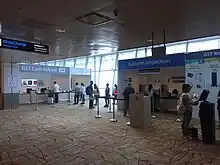
Although this discussion gives examples for U.S. customs processes, the basic precepts apply widely.
If you plan to travel to other countries, you don't want to risk paying duty (as you return) on items (especially valuables) you already own and take on your trip...even including engagement rings. As you return from any international trip, you can be charged duty on all valuables you have with you that exceed your duty exemption.
For fine jewelry, newer model cameras, electronics, computers, etc., your government's customs bureau likely offers a means to avoid the problem. As an example, U.S. citizens can go to the Customs web-site for a Form 4457 mentioned in their other pages under "Know Before You Go" . For most people anywhere, the steps essentially include...
- Fill out as many forms as needed (how to do so can vary by the site you're using) to adequately describe the items you're likely to take on any international trip. Indicate any serial number on any item. You are allowed to list more than one item on each form. Print each completed form, done on-line or saved to computer.
- Take the items, the forms and proof of ownership to a customs office. As the agent sees them, he/she can certify on the forms that you already own them. (The web site for those forms should offer a link to help you locate the nearest customs office.) In some countries, this service may be available at post offices.
- Plan ahead. Unless you have plenty of time, don't count on getting those forms certified as you depart your country. Customs officers at air and cruise ports are typically very busy.
Take whatever valuables you choose; just remember related customs forms on your international trips, and have them handy for Customs inspection as you return to your home country. Original store receipts from merchants in your country can be a fair substitute for proof of prior ownership if you lack time or access to a customs office before your trip. Even if dated well before your trip, receipts from sellers in other countries often have little standing.
You may want to have copies of these documents stamped at customs abroad, or at least declare the items on local customs forms and get those documents stamped – as on your way out, that custom may not trust your foreign documents (see Border crossing#Prepare).